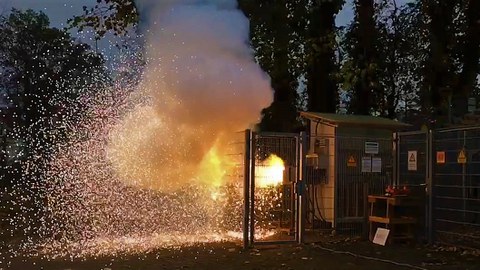Sep 04, 2019
Positive feedback for the Research Centre for Arc Disturbances (NARC) at TU Dresden

Experimental demonstration of arc faults at the NARC test rig
Since 2006, high-current interference and switching arcs in low voltage have been investigated at the TU Dresden. In order to expand research and development in this area, a new competence center, the National Arc fault Research Center (NARC), was officially opened in June of this year in the southeast of the campus. The Competence Center is part of the Chair for Electrical Energy Supply at the Institute for Electrical Energy Supply and High Voltage Technology at the TU Dresden and currently comprises a team of 7 scientists.
An electric arc is an electric gas discharge between two electrodes. If this arc does not occur during operation but unintentionally due to a fault, it is referred to as a fault arc. The arc fault can have currents of several tens of thousands of amperes and lead not only to fire, but also to the complete destruction of a switchgear system. The consequences are production downtime, which can mean a loss of up to 500,000 euros per hour for large data centers, for example.
Causes of an arc fault can be assembly errors, forgotten tools or non-compliance with maintenance and inspections. Incorrectly dimensioned equipment, human error or material defects can also lead to an arc fault. Last but not least, animals are also a possible cause.
At NARC in Dresden, AC and DC arcs with arc currents of up to ten kilo amperes can be investigated. The trainer offers the possibility to demonstrate the damage of electric arcs on persons on a test dummy and to show and investigate the effects on protective systems and electrical equipment. In addition to scientific research, NARC offers investigations and demonstrations on occupational health and safety with various focal topics. In a research project with an international company in which ten international patent applications have already been filed, NARC is primarily concerned with the rapid detection of arc faults in order to protect systems in the event of an arc fault. The positive feedback from industry and the high demand motivate the NARC team in its research: "The successful course of the project so far shows us that transfer from science to industry is in demand in the form of company-specific investigations. It is very important to us to make a contribution here and to point out the danger of arc faults, but also to further develop detection in order to prevent serious accidents," says Jan Keller, project coordinator at NARC.
In addition to the seminars at the Dresden site, NARC also conducts workshops in companies and institutions on the subject of arc faults and arc fault protection. These are individually designed for the respective target group. "In addition to further training, we are currently investigating arc faults on high-performance battery systems. Due to the increasing relevance of battery storage as a result of the energy revolution, we will expand these activities as a further field of competence," explains Jan Keller.
Contact for journalists
NARC Karsten Wenzlaff (scientific director) Phone: +49 351 463-43200 www.narc-dresden.de
